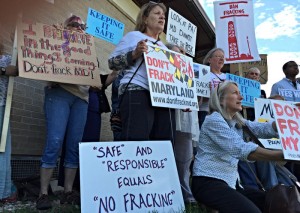Fracking in Maryland: Just like PA and WV. Really?
From Engage Mountain Maryland, June 22, 2016, http://www.engagemmd.org, EngageMountainMaryland@gmail.com
Maryland Department of the Environment, MDE, has published “Issue Papers” that outline the regulations on hydraulic fracturing, “fracking” for Maryland. The 2.5 year moratorium will expire in October of 2017. With the moratorium came a mandate to draft regulations for gas development in the state.
The “Issue Papers” state that the proposed regulations are designed to protect the public and environment from harm, but the details reveal a contradiction as MDE draws upon Pennsylvania and West Virginia regulations for guidance. Both states have been highly criticized for ignoring pubic safety to be more competitive when considering exploration of natural gas.
Guests at the meeting were given an opportunity to make public statements, but questions were not invited. The range of comments were well informed and suggested that MDE had dropped the ball, favoring natural gas development at the expense of Maryland’s environment and public health.
Attend the next meeting and speak out! Wednesday, June 29, 6:00 PM-8:00 PM
Garrett College, 687 Mosser Road, Auditorium, Room 715, McHenry, MD 21541
Regulations or permission? Industrializing Maryland’s landscape.
Guests at the meeting expressed outrage over the lackadaisical framework of the regulations allowing setback waivers, well sites close to natural habitats and streams, and recommendations for untested well construction standards. Public comments pecked away at nearly every aspect of the regulations, pointing out the intent of MDE to make Maryland competitive with neighboring states regarding natural gas development.
1. MDE suggests that increasing layers in a well casing will make drilling sites less likely to impact the environments and habitats located close to wells. The engineering recommendation has no foundation. Current technology standards lead to an average of 6% failure rate at the time a well is drilled. Adding more layers of materials with a proven high failure rate was highly criticized. Over 15 years, 50% of all well casings fail and all of them eventually fail over time. Failure is expected from the trauma inflicted by high pressure used to fracture the shale layer and the corrosive chemicals that deteriorate construction materials.
2. MDE suggests that with “improved” well casings, it allows for reduced setbacks. In many instances, the setbacks are less than half the recommendation established by the O’Malley Regulations that were developed over a three-year period and using much scrutiny. The were coined the “Gold Standard” for natural gas development regulations. A guest stated that the standard MDE is setting is not gold, silver, or even bronze.
3. There was no mention of oversight and how regulation enforcement will be carried out. As was explained through public comment, when the windmills were being constructed, it was up to citizens to report problems and provide proof of permit violations before anything was done to address problems. Natural gas development has far reaching public health ramifications beyond the well pads. Raising this issue of concern underscores the need for policing an industry cited for reckless practices.
4. A common thread through public comments was how “insulted” residents were that MDE would even suggest following standards of Pennsylvania and West Virginia. Communities in our neighboring states have suffered greatly from natural gas development and have little hope of reversing the negative effects of industry invasion. MDE was scolded and berated for following substandard practices and outdated science that violates the purpose of regulations and the departments purpose to protect public health and the environment.
5. Other comments raised the issue that no new data were gathered to understand the impacts of natural gas development on air quality, water, and soil. With continuous study available, MDE has overlooked valuable information that could influence regulatory measures. Again, health related matters have been ignored while massive amount of information make direct links to numerous and serious health issues associated with fracking.
Defend yourself and where you live! Submit your views.
Admittedly, this is some very dry reading, but so important to the future of Maryland and its residents. We recommend that you take the time to review the proposed regulations from MDE and make plans to submit your comments. Your knowledge of what the state is proposing adds strength to your statements.
Engage Mountain Maryland will continue to keep you informed on this issue.
Comments can be submitted via email (select link) or regular mail (address below).
Attn: LMA Director’s Office
Maryland Department of the Environment
1800 Washington Boulevard, Suite 610
Baltimore, MD 21230

